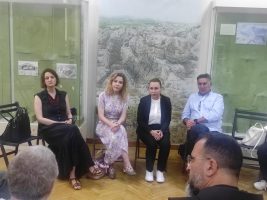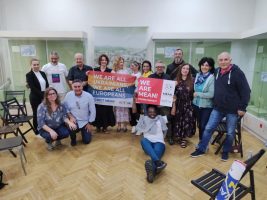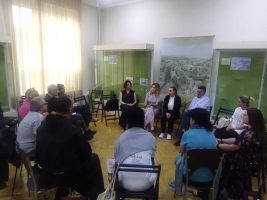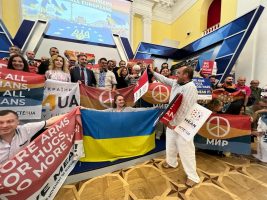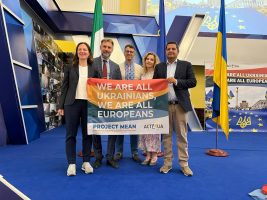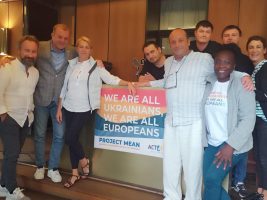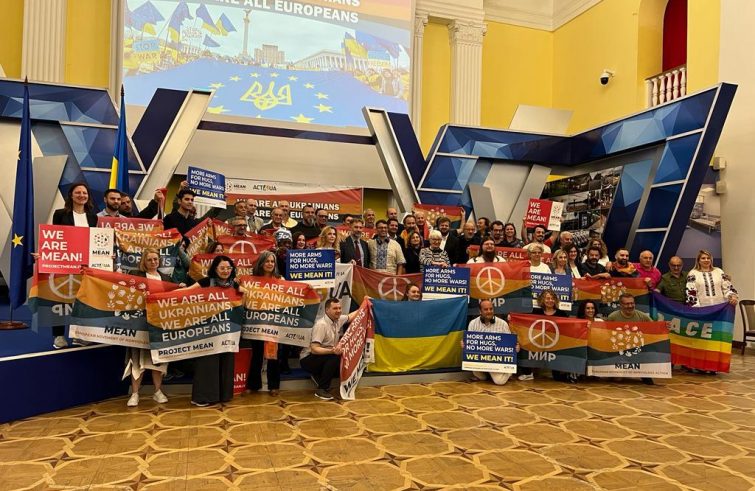
“We are here today to ask, as sister civil societies, that Europe carry out its diplomatic efforts to the full. Europe must support Ukraine and kick-start the peace talks at once! No one can rest on laurels until this land and this people are attacked. Success for Ukraine! Europe should go ahead! Onward with peace!”. Angelo Moretti, spokesperson of the European Movement of Nonviolent Action (EMNA), thus concluded his speech at the Non-violent Rally for peace in Kyiv on July 11. We asked him for an account of the event.
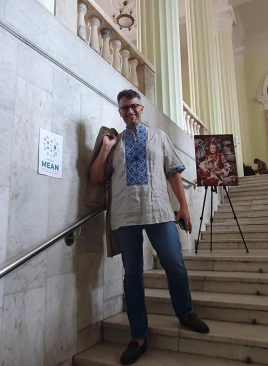 What was the outcome of the non-violent rally for peace?
What was the outcome of the non-violent rally for peace?
I can safely say that the overall outcome, with no exaggeration, was extremely positive. Only two months ago the possibility of speaking openly about peace and non-violence in Ukraine, without being misunderstood as someone wanting this people to ‘surrender’, was a dream. The hard work of weaving friendships has been instrumental in clarifying the words:
we demonstrated together, Italians and Ukrainians, in favour of peace and active non-violence, calling for diplomatic action and for an immediate ceasefire.
Those who consider the people of Ukraine war-mongering zealots, who only ask for weapons for combat, now have no excuse for persisting with their stereotypes: on July 11, the Ukrainians told the world that they are a suffering people, prepared to resist until death lest they surrender their freedom to an invading country, but that they are more than willing to surrender their weapons to international diplomacy and, above all, to European diplomacy if the latter succeeds in brokering a ceasefire.
How many joined from Italy?
Fifty-four people representing different worlds, ranging from secular to Catholic, from civicism to activism, from national networks such as Catholic Action, MASCI, MOVI, Base Italia (whose leader Marco Bentivogli attended and participated in the entire event) as well as Charity Networks and civic networks, such as ‘Grosseto al Centro2’ and ‘Civico22’ from Benevento. The group included activists inspired by Alex Langer, coordinated by Marianella Sclavi and experts Paolo Bergamaschi and Pinuccia Montanari, along with representatives of Italian welfare, such as Simone Feder and the volunteer workers of Archè, Emergency activists such as Luca Cisotta, and various representatives of socially responsible journalism, notably “Vita Non Profit” along with anti-mafia journalist Marilù Matsrogiovanni, Radio Popolare and many others. Actively involved artists, labourers and dedicated priests, such as Father Giacomo Panizza and Brother Fedele Mattera, also attended the peace gathering.
- (Foto: Mean)
- (Foto: Mean)
- (Foto: Mean)
During the event, did you find a convergence of your peace proposal with the views of those – Ukrainian institutions and associations – bearing the brunt of the war?
To begin with, it must be said that the language of signs and slogans displayed at the event was the primary language of our initiative. Several announcements were posted at the entrance to Kyiv’s City Hall informing that its most prestigious hall, the Hall of Columns, would be hosting the EMNA event, indicating that people are no longer afraid to openly and publicly express the notion of non-violence in Ukraine and not be mistaken for a defector, a pro-Russian activist or a citizen capitulating to aggression, as was the case two months ago.
The slogans: ‘We are all Ukrainian, we are all European’ and ‘More arms for hugs, no more wars’ lined the hall, as did three flags: Italian, Ukrainian and European.
The preparation of the various stages of the dialogue was marked by rhetoric, which is inevitable and perhaps even necessary in a country with an East European national culture, subjected yet again to the violence of war. The meeting thus only got into full swing after the three national anthems. The ceremony to introduce the mayor of Kyiv, Vitalji Klitschko, gave the latter a solemn opportunity to be heard.
The speech by the Apostolic Nuncio, Archbishop Visvaldas Kulbokas, was equally welcomed by all those present, an example of remarkable harmony between the reasons for self-defence and the reasons for non-violence, but it was also a moment of truth regarding the aggression and the need to seek an alternative course of action to end the conflict without further bloodshed.
The successive speeches highlighted significant milestones, the pro-European vocation of the Ukrainian people, the condemnation of the aggression as well as the possibility for organised non-violent resistance of all European civil society to join that of Ukrainian civil society.
The focus of the day was:
nobody can afford to feel exempt from this war and especially from this peace.
While we cannot stop at merely sending weapons for the resistance of the Ukrainian people – for weapons are never a solution to war – we can neither think that the solution is to remain safely locked up in our own countries and wait for the war to end. We must all participate in peace-making, not by proxy, but by being physically present where the war is being waged, for otherwise only the power of weapons will speak. And we will be the ones to blame for having abandoned the Ukrainians alone to fight an enemy that has four times their nuclear power and armed forces.
- (Foto: Mean)
- (Foto: Mean)
- (Foto: Mean)
What atmosphere did you find in Kyiv? What are the prevailing feelings among the population at large?
They are definitely exhausted, they live in a state of ‘existential suspension’,
amidst air-raid sirens sounding throughout the day, slumped tourism after two years of Covid, a sharp slowdown in economic growth, and the largely empty squares of Kyiv. Tatyana, the Ukrainian mediator who guided the convoy, hadn’t returned there since 2018. When she saw her capital again, she broke into tears at the sight of its desolation. The beautiful Hagia Sophia Square without tourists strolling through, the national museum turned into a hub for the distribution of food packages, the shattered buildings and charred streets. But the people are anything but defeated. They have no intention of falling under Russian influence. They are perhaps the first people since 1956 who are paying this very high price to defend their aspiration for a European identity.
The tension is high, but it appears to be handled well. The reception given to some government opponents during our two-day event also signalled that Ukraine is actively engaged in improving its democracy and upgrading it to EU standards.
After your return to Italy, how is EMNA’s support for the Ukrainian people being pursued?
One thing is sure: the people of Ukraine cannot and must not be left alone.
Standing with them means stripping the war of its venom, lessening the damage, preventing this plague from escalating into relentless and merciless rancour, but not only that. It also means actively contributing to ensure smooth evacuations, the protection of museums and their cultural heritage, ensuring the resumption of tourism as soon as possible, protecting children, and ultimately nurturing young people’s hope to build a Europe brighter than it is today.
We will continue to stand by their side and, as our next step, we will promote town-twinning relations between the Italian and Ukrainian communities. Indeed, as we have witnessed ourselves, the best welcome is being offered by western Ukrainians to eastern Ukrainians, without uprooting their fellow citizens and with NAthe dream of building a post-war future at once, avoiding new diasporas. And we will stand by them on this as well.

